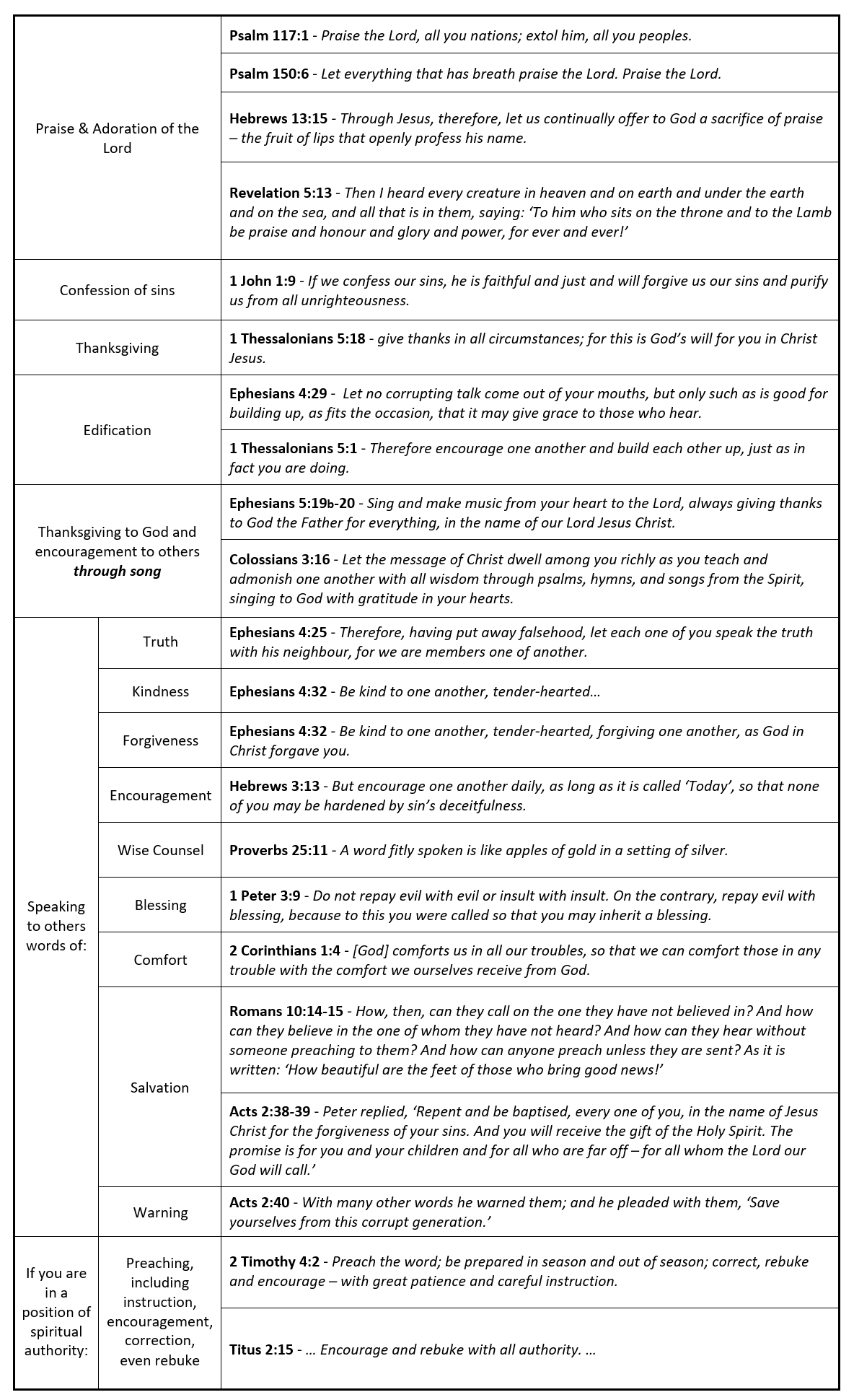In the first part of this article, we looked at the power of the tongue, the various sins of the tongue of which Scripture speaks, and what the consequences of those sins are.
Here in part 2, we examine practically just how we can begin to tame our tongue. At the end of the article, there are discussion questions for use individually, or as part of your Music Network group.
So, let us listen to our Father’s voice as He bids us:
Come, my children, listen to me; I will teach you the fear of the Lord. Whoever of you loves life and desires to see many good days, keep your tongue from evil and your lips from telling lies. Turn from evil and do good; seek peace and pursue it.
Taming the tongue
Pray
We begin where we left off at the end of part 1, with prayer. Because if we saw anything from part 1’s overview of the sins of the tongue, it was that we have all fallen short. We are all guilty, and all of us are in need of forgiveness. And so we need:
- to begin with prayers of repentance.
- And even more practically, let me exhort us all to make prayers of repentance a regular part of your life. There is now no condemnation for those who are in Christ Jesus, and yet guilt and shame are manifestly commonplace in many Christians’ lives. And although it’s not the sole cause, one reason for this is that we are not quick to pray prayers of confession and repentance. Make it a habit, at the end of each day, to review the day just gone by: to think of the snide gossipy comments you made about your desk partner, to recall the white lies you told your teacher so that they wouldn’t be so cross with you, to remember the coarse humour you employed during the rehearsal in the hope that the others there would think better of you… Consider all these things. Confess them for the sins they are. And repent of them, asking God for the forgiveness He promises His people. Not only is it the right thing to do, it is also a very liberating thing to do, as the Lord’s forgiveness floods over you once again, drowning the guilt and shame that the devil would love to rub in your face.
However, our natural sinfulness also means that we lack the strength in and of ourselves to change ourselves so that we don’t simply carry on doing likewise in the future. And so we need:
- to beg the Spirit for growth in self-control.
- Taming the tongue is an exercise in self-control. Self-control, we learn in Galatians 5:23, is part of the fruit of the Spirit. In other words, true, effectual self-control is only possible with the help of the Holy Spirit of Jesus living within us. So if we want to see progress in keeping a tight rein on our tongues, we will need to ask for the Spirit’s help.
- Make it a habit, before lunch in the canteen, before each rehearsal, before the post-concert pub trip, to send up an arrow prayer, asking that the Holy Spirit would help you be self-controlled with your tongue. That is a prayer we know the Lord loves to answer, for it is fully in line with His will.
- to ask the Lord for opportunities to speak truth and grace.
- In a battle, it is not enough simply to have your defence in order, to be protected from the opposition’s attacks; rather you also need to mount an offensive, to know how to advance. And so let us not only seek the Lord’s help in enabling us not to say what we shouldn’t, let us also seek His help in enabling us to say what we should! It may be a kind word when a friend flunks an audition, or a genuine compliment when they play their solo excellently; it could be a difficult word of truth when a false claim is made, or it could be a chance to talk of the hope that only Jesus can bring when the opportunity presents itself. In all of these situations, we can often be cowardly, lacking the boldness to say what needs to be said, so let’s make it a habit, at the start of each day, to ask the Lord for opportunities to speak truth and grace, to use our tongue in a way that brings glory to Him.
THINK
Some of you will know this acronym already, and it’s a useful thing to remember when you’re about to say something, especially of another person. At that moment, ask yourself, 'is what I’m about to say…
- Truthful?
- Helpful?
- Inspiring?
- Necessary?
- Kind?
One little note here: on whether something is necessary, that is worth considering in light of the timing. As in, something may be truthful and helpful, but perhaps to say it at this moment would not be necessary and/or particularly kind. And probably not inspiring therefore. Or as one Bible writer put it, rather more poetically:
Like one who takes away a garment on a cold day, or like vinegar poured on a wound, is one who sings songs to a heavy heart.
Get support
We all need support in this battle for our tongues. And so get support! Ask a Christian friend, perhaps someone in the CU who you see a lot of in your studies, or perhaps someone in your church small group, to keep you accountable in this. Indeed, ask them to pray specifically about this for you. After all, we can be quick to do this with other kinds of sins (e.g. sexual), yet as we saw in part 1, these sins are equally serious, so why wouldn’t we ask for such prayers?
Fight
At the end of the day, this is a battle. We can request all the support in the world from friends, and indeed we can pray all we like (and it will make a difference, sure!), but in the moment of temptation, we will always face a choice: to submit to sin, or to tame the tongue. We can’t overspiritualise this! Yes, pray, yes, think, and yes, get support, but be prepared actually to fight. This is a battle in which, with the Lord’s help, we can make progress, and with whose strength, we can win victories. But only if we are prepared to fight! And of course, praying, thinking, and getting support are, in a way, the best preparations for fighting, for making the right choice in the actual moment of temptation.
The practices of a redeemed tongue
In part 1, we looked at the power of the tongue and the various destructive practices of the tongue. But of course, as we’ve already hinted at, the tongue also has great power to do great good. And when it does so, it has become what we might call a “redeemed tongue”. And Scripture also gives us plenty of examples of what these practices look like:

The product of these practices
Godly conduct has consequences. Good consequences! And here are two that the Lord explicitly states as resulting from redeemed usage of our tongues:
Life
Remember Psalm 34, which we quoted at the beginning of part 2? Well, so did Peter, who in his first epistle reminds us:
For, ‘Whoever would love life and see good days must keep their tongue from evil and their lips from deceitful speech.'
Quite simply, this means that there are certain ways in which a redeemed tongue yields ‘life’ and 'good days' that will be loved and enjoyed as a blessing from God. Who wouldn’t want that?
Good witness
Paul makes the link between a redeemed tongue and a good witness explicit in his letter to the Philippians:
Do everything without grumbling or arguing, so that you may become blameless and pure, ‘children of God without fault in a warped and crooked generation.’ Then you will shine among them like stars in the sky as you hold firmly to the word of life.
Hopefully the connection is obvious: as we…
- tell the truth, in all honesty and integrity, even when we’re at fault
- say a kind word about the conductor who everybody else is complaining about
- are quick to forgive the competitor who slandered you maliciously
- encourage the peer who’s feeling down about their playing ability
…we should find that the impression this makes on those observing us, as they perceive a very real difference in the way we use our tongues, causes them to ask more questions and to be more open to hearing the gospel, whereby the words we say may just lead to eternal life!
So…
In conclusion, we need to recognise the power of our tongues, for good or for evil, and to recognise what a major area of discipleship this is. As we do that, the battle for our tongues ought to become a major part of our prayer life, and in time, the fruit of our lips will be less rotten and more sweet.
Whether you’re reading this alone, or studying it as part of a Music Network group, or music college CU, why not spend some time deliberating these questions which are designed to help you respond:
- How great do you tend to consider the power of the tongue? To what extent does this align with the Bible’s understanding?
- Which sinful practices of the tongue are you most prone to commit, perhaps even without noticing? What do you need to repent of right now?
- Which sinful practices of the tongue are most prevalent in the musical ensembles in which you are involved?
- How could you ‘shine among them like stars in the sky’ in these situations? What would that look like?
- Can you think of a time when you said something (or someone said something to you) which, though true, wasn’t said at the right moment? How could you/they have been wiser in your use of the tongue in that situation?
- What positive practices of a redeemed tongue could you be most intentional in employing?
- Which of these positive practices do you find most hard to employ naturally? Why is that?
- How could you incorporate this area of discipleship more into your prayer life?
- Who could you ask to pray for you and keep you accountable in this area of discipleship?
- How might you use your tongue more (and/or better) to speak of Jesus to those who do not yet know Him?

